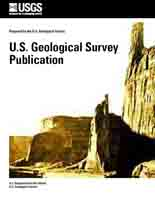
Geologic map of the MTM -85080 quadrangle (revised), Planum Australe region of Mars
Links
- Plate: Plate 1 (pdf)
- Data Release: USGS data release - Geologic map of the MTM -85080 quadrangle (revised), Planum Australe region of Mars
- Download citation as: RIS | Dublin Core
Abstract
Published geologic maps of south polar region of Mars have been based on either Mariner 9 (Condit Soderblom, 1978; Scott and Carr, 1978) or Viking Orbiter (Tanaka and Scott, 1987) images. The mapped extent of the southern layered deposits differs in many places on these maps and on our maps. These differences reflect the difficulty in accurately determining the location of the contact between the layered deposits and subjacent units. The polar layered deposit gradually thin toward their margin in many places, and the smooth surface features that characterize the layered deposits are also found on other sedimentary blankets in the south polar region (Murray and others, 1972; Sharp, 1973).
Previous workers have also reached different conclusions regarding the origin of the lower member of the Dorsa Argentea Formation, which was named by Tanaka and Scott (1987) and interpreted by them as volcanic in origin (based on observation of flow fronts in areas far outside this quadrangle). The lower member, previously called pitted material, and other sedimentary, and other sedimentary units were recognized in Mariner 9 images and described by Murray and others (1972), Sharp (1973), and Cutts (1973b). Sharp (1973) argued for exhumation of pits by wind, perhaps aided by sublimation of volatiles. He concluded that the massive pitted sediments of the lower member unconformably overlie older massive units. We have mapped one of these older units ridged and knobby material. Condit and Soderblom (1978) found some layered deposits within pits, which indicates that erosion of the pits was completed before accumulation of the layered deposits commenced. Howard’s (1981) suggestion that the pits may be formed by basal melting of ground ice is consistent with either a volcanic or sedimentary origin for the lower (pitted) member. Plaut and others (1988) mapped the extent of the pitted material and found that it overlies volcanic plains wherever the contact is visible. They concluded that the pitted material is no more than 1 km thick and is about 3.3 billion years old (Late Hesperian).
Suggested Citation
Herkenhoff, K.E., Murray, B.C., 1994, Geologic map of the MTM -85080 quadrangle (revised), Planum Australe region of Mars: U.S. Geological Survey IMAP 2391, 1 Plate: 37.00 x 32.00 inches, https://doi.org/10.3133/i2391.
| Publication type | Report |
|---|---|
| Publication Subtype | USGS Numbered Series |
| Title | Geologic map of the MTM -85080 quadrangle (revised), Planum Australe region of Mars |
| Series title | IMAP |
| Series number | 2391 |
| DOI | 10.3133/i2391 |
| Year Published | 1994 |
| Language | English |
| Publisher | U.S. Geological Survey |
| Description | 1 Plate: 37.00 x 32.00 inches |
| Other Geospatial | Mars |
| Scale | 500000 |
| Online Only (Y/N) | N |
| Additional Online Files (Y/N) | N |

